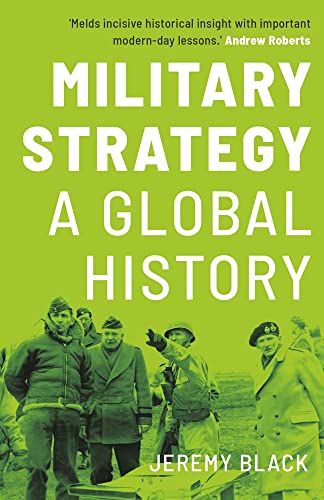Military Strategy: A Global History

“The heart of Black’s book is his discussions of strategy in the context of the contests for power among states and empires from the French Revolution and Napoleonic Wars . . . to the Cold War and post-Cold War conflicts.”
The remarkably prolific Jeremy Black in his book Military Strategy: A Global History (just reissued in paperback) emphasizes the complexities and varying natures of strategy as theorized and practiced since the 18th century. He defines strategy as “the ways by which nations, states, rulers, elites and others seek to shape their situation, producing international and domestic systems and pursuing outcomes that provide security, and that safeguard and advance interests.” And the contexts of strategy are “contests for power . . . at every level.”
Black’s book is global in scope. He considers the great and well-known strategic thinkers—Sun Tzu, Thucydides, Clausewitz, Jomini, Mahan, Douhet, Fuller, Liddell Hart, and others—as well as well-known practitioners of strategy, such as Frederick the Great, George Washington, Napoleon, Wellington, Grant and Lee, Moltke, and Mao Zedong. But his study also reaches lesser-known strategists such as Russian Generals Mikhail Dragomirov and Genrikh Leer, the Kangxi, Yongzheng, and Qianlong emperors of China, Agha Muhammad of Persia and Zaman Shah of Afghanistan.
It is a principal theme of Black’s work that strategy can only be understood in context—it is truly situational. Continental states pursue strategies that differ from maritime states. Great power strategies differ from those of medium and small powers. The strategies of popular democracies will likely differ from authoritarian powers. And personalities matter. Louis XIV, Napoleon, and Hitler suffered defeats because they had seemingly unlimited ambitions, while Washington and Bismarck had limited ambitions which translated into prudent statecraft.
Strategy is also conditioned by technology. Naval strategy changed from the age of sail to the age of steam and changed again with the advent of air power. And the nuclear era witnessed the birth and development of the new and still evolving field of strategic studies—with its own strategists (Bernard Brodie, Herman Kahn, Albert Wohlstetter, Henry Kissinger) and vocabulary (throw weight, MIRVs, ICBMs, “first-strike” weapons). Black notes that today artificial intelligence (AI) “will change strategy, not least by speeding up decision-making.”
Black writes that individual nations and states develop “strategic cultures” that are conditioned by geography, alliances, relative population, character of government, economic wherewithal, and ideologies. Strategies cannot be fully understood without considerations of domestic politics, including the relationships between political and military leaders.
The heart of Black’s book is his discussions of strategy in the context of the contests for power among states and empires from the French Revolution and Napoleonic Wars, to the American War of Independence, to Great Britain’s wars of empire, the American Civil War, the Italian and German wars of unification in the mid-19th century, to the First and Second World Wars, to the Cold War and post-Cold War conflicts.
Black notes that strategy is formulated and implemented in environments that are rife with uncertainty—uncertainty about the enemy, uncertainty about allies, uncertainty about the domestic fallout from pursuit of your strategy, and above all, uncertainty about the final outcome of the struggle. Clausewitz’s “friction” is ever present, as is Edward Luttwak’s concept of the paradoxical logic of strategy.
The one constant feature of all of the struggles for power that Black reviews is what he calls “the political dimension of strategy.” War, as Clausewitz wrote, is the continuation of politics by violent means. Politics--both domestic and international—shapes all aspects of war, including rival strategies. And those rival strategies are often flawed. As Black notes, “When two powers or forces go to war, generally both believe that they will win and gain benefits from their victory, and at least one is always wrong.”